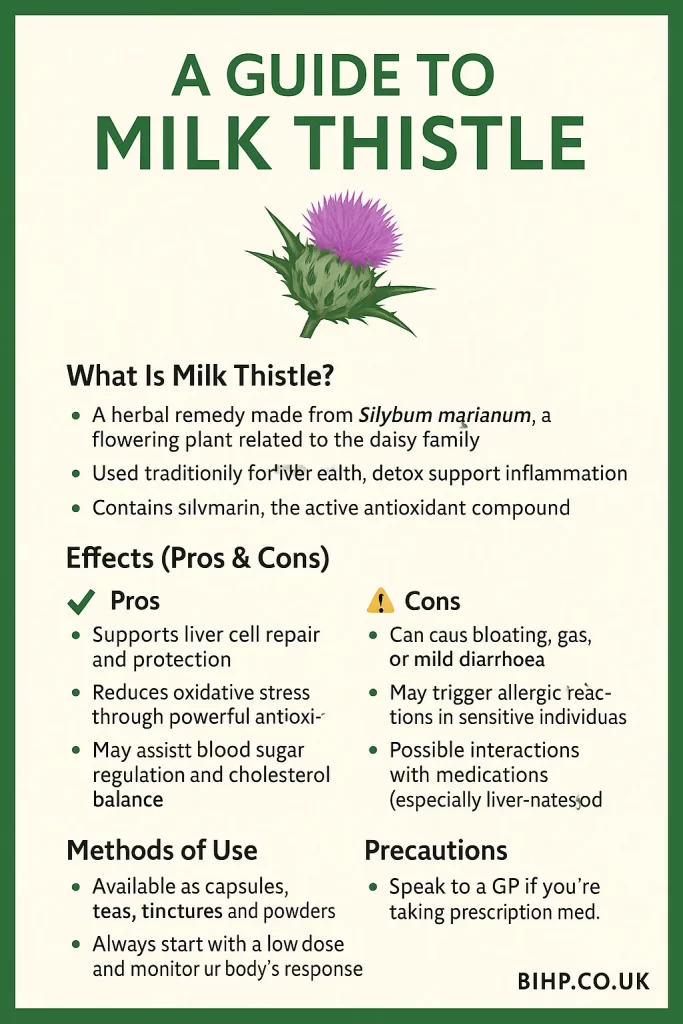
🌿 Understanding Milk Thistle Pros and Cons
Milk thistle has been used for centuries, often praised for its potential health benefits. However, like many natural remedies, it comes with both benefits and limitations. In this article, we’ll look closely at the milk thistle pros and cons without the fluff, so you can make an informed decision.
🧪 Traditional Uses and Modern Interest
Milk thistle, also known as Silybum marianum, is a flowering herb related to the daisy family. Traditionally, it’s been used to treat liver issues and promote detoxification. Its active compound, silymarin, is thought to be the source of its health-supporting power.
You’ll find milk thistle in capsules, tinctures, teas, and powders. While many take it for liver support, others use it for skin health, inflammation, and cholesterol balance.
⚖️ Looking at the Milk Thistle Pros and Cons
Let’s take a balanced look at the milk thistle pros and cons to help you weigh things up.
✅ Benefits That Make It Popular
Supports Liver Health
Silymarin, the key compound in milk thistle, is believed to protect liver cells and aid their regeneration. Research suggests it may be helpful for people dealing with liver conditions such as non-alcoholic fatty liver or hepatitis.
Powerful Antioxidant
Milk thistle contains antioxidants that help reduce free radicals in the body. This benefit can lead to healthier cells and reduced inflammation.
Supports Blood Sugar Balance
Some research indicates that milk thistle may improve insulin resistance and help manage type 2 diabetes. It isn’t a treatment in itself, but could complement your current health plan.
May Lower Cholesterol
Although evidence is still emerging, early results show milk thistle might help reduce LDL cholesterol when paired with a healthy lifestyle.
Skin Support and Anti-Ageing
Topical or oral use of milk thistle may help calm irritated skin and reduce signs of ageing. That’s thanks to its antioxidant-rich profile.
⚠️ Side Effects and Warnings
Digestive Upset in Some Users
Mild side effects like bloating, gas, or diarrhoea can occur. These usually subside with regular use, but it’s still worth noting.
Possible Allergic Reactions
People allergic to plants like ragweed, daisies, or marigolds may also react to milk thistle. Rash, itching, or breathing issues are rare but possible.
Drug Interactions
Some compounds in milk thistle could interfere with how your body processes specific medications.
Liver-metabolised medications, such as statins or some antidepressants, could be affected by its presence in the system. Always consult a doctor first.
Not for Everyone
Pregnant or breastfeeding women should avoid it unless directed by a professional. Also, people with hormone-sensitive conditions may need to steer clear.
💡 Why This Information Is So Useful
There’s a lot of hype around herbal supplements. But understanding the milk thistle pros and cons keeps you grounded. Many people assume “natural” means “safe” for all – and that’s just not the case.
If you’re hoping to protect your liver or improve your body’s natural defences, this herb might offer gentle support. However, ignoring the potential downsides could do more harm than good.
🔬 Clinical Evidence and Ongoing Studies
Some studies have shown it may help improve markers of liver health and help with inflammation, though more robust data is needed.
While many herbs work best in combination with lifestyle changes, milk thistle is no different. Relying on it alone, without addressing diet or exercise, won’t bring miracle results.
Additionally, some clinical trials have shown mixed outcomes. For example, some people with fatty liver disease improved, while others showed minimal change. These results highlight the importance of personalised care.
📝 Final Thoughts on Milk Thistle Pros and Cons
The milk thistle pros and cons reveal it’s not a one-size-fits-all remedy. For some, it brings real benefit—especially for liver and skin support. For others, there’s a chance of minor reactions or unwanted effects.
If you’re considering milk thistle, do your research and consult a professional. Start with a small dose and track how your body reacts.
When taken sensibly and with proper guidance, milk thistle can be a helpful addition to a natural health routine.
Milk thistle is a well-known herbal remedy with a long history of traditional use, often discussed for its potential benefits as well as points to consider when using herbal ingredients. Learning about both the positives and limitations of natural remedies helps support informed and balanced choices. To explore other herbs used traditionally for gentle support, visit Herbs for Stress Support | Natural Ways to Find Balance, where plant-based remedies are shared in a calm and informative way.




